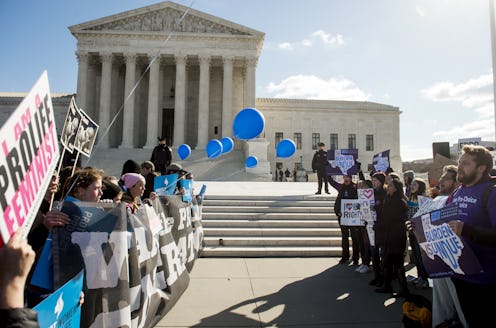News
This SCOTUS Rally Sign Is Absolutely Flawless
As the Supreme Court began hearing arguments in the case of Whole Women's Health v. Hellerstedt on Wednesday, rallies were held outside the Court expressing views from both sides of the abortion debate. The case was brought to the nation's highest court to determine whether a 2013 Texas law that will reduce the number of abortion clinics in the state from 40 to six will be upheld. Those standing both for and against restricting access to abortion gathered outside the court holding signs representing their respective views, and one in particular hilariously captured the spirit of Roe v. Wade.
Roe v. Wade was decided in 1973, when the Supreme Court concluded that the decision to have an abortion is protected as part of the right to privacy. Of course, that does not mean that any woman can walk into an abortion clinic and get an abortion at any time for any reason; states have their own laws legislating the circumstances in which abortions can be performed. The New Yorker credited former Justice Sandra Day O'Connor with introducing the "undue burden" standard for prohibiting certain restrictions. If a law creates what is seen as an "undue burden" on accessing abortion, then it is not allowed.
So while some restrictions might be justified, the sentiment behind Roe — that, for the most part, abortion is a private matter — has remained in place. This emphasis on privacy was perfectly encapsulated in one woman's sign at the rally on Wednesday. Playing off the classic, "What kind of cheese is not yours?" joke, the sign read, "It's Nacho Uterus."
The 2013 Texas law being argued in Whole Women's Health v. Keller requires abortion clinics in the state to meet the criteria to be "ambulatory surgical centers," which most of them do not, and that doctors performing the procedure be able to admit patients to a hospital within 30 miles of the clinic providing the abortion. The court will have to decide whether there are valid justifications for these requirements, and whether they impose upon a woman's right to privacy.
As the "Nacho Uterus" sign creator clearly indicates, some reproductive rights advocates have already formed their opinion: The law infringes upon women's bodily autonomy and right to privacy.
